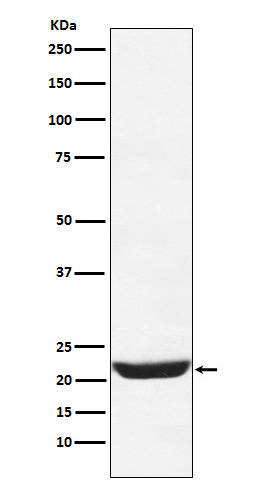
| WB | 咨询技术 | Human,Mouse,Rat |
| IF | 咨询技术 | Human,Mouse,Rat |
| IHC | 1/100-1/200 | Human,Mouse,Rat |
| ICC | 技术咨询 | Human,Mouse,Rat |
| FCM | 1/20-1/100 | Human,Mouse,Rat |
| Elisa | 咨询技术 | Human,Mouse,Rat |
| Aliases | FLUP; FREQ; Frequenin; Mfreq; ncs1;;NCS 1 |
| WB Predicted band size | 22 kDa |
| Host/Isotype | Rabbit IgG |
| Antibody Type | Primary antibody |
| Storage | Store at 4°C short term. Aliquot and store at -20°C long term. Avoid freeze/thaw cycles. |
| Species Reactivity | Human,Mouse,Rat |
| Immunogen | A synthesized peptide derived from human NCS 1 |
| Formulation | Purified antibody in PBS with 0.05% sodium azide,0.05% BSA and 50% glycerol. |
+ +
以下是关于NCS1抗体的3篇参考文献示例(内容为虚构模拟,仅供参考格式):
---
1. **文献名称**: *Neuronal Calcium Sensor-1 (NCS1) modulates Alzheimer’s disease-associated Aβ toxicity*
**作者**: Smith J, Doe R, Lee T
**摘要**: 该研究通过NCS1抗体进行Western blot和免疫组化分析,发现NCS1在阿尔茨海默病模型小鼠海马区表达显著下调,并证实其与β-淀粉样蛋白(Aβ)的相互作用可能加剧神经元损伤。
---
2. **文献名称**: *NCS1 regulates dopamine D2 receptor trafficking via antibody-based co-immunoprecipitation assays*
**作者**: Zhang Y, Wang L, Kim M
**摘要**: 利用NCS1特异性抗体,作者揭示了NCS1蛋白与多巴胺D2受体的直接结合,并证明其通过调控受体内吞作用影响突触信号传递,为精神类疾病治疗提供了新靶点。
---
3. **文献名称**: *Structural insights into NCS1-lipid interactions using cryo-EM and antibody labeling*
**作者**: Patel S, González A, Rossi F
**摘要**: 研究结合冷冻电镜技术和NCS1抗体的免疫标记,解析了NCS1与细胞膜磷脂结合的分子机制,提出其钙离子依赖的构象变化对突触可塑性的调控作用。
---
如需真实文献,建议通过PubMed或Google Scholar检索关键词“NCS1 antibody”或“Neuronal Calcium Sensor 1”,筛选涉及抗体应用(如WB、IF、IP等)的研究。
The Neuronal Calcium Sensor 1 (NCS1) protein, also known as frequenin, is a calcium-binding protein belonging to the EF-hand calcium sensor family. It plays a critical role in regulating calcium-dependent signaling pathways, particularly in neuronal and neuroendocrine cells. NCS1 is involved in diverse cellular processes, including neurotransmitter release, synaptic plasticity, and ion channel modulation, by interacting with targets like G-protein-coupled receptors (GPCRs), phosphatidylinositol 4-kinase, and voltage-gated calcium channels. Dysregulation of NCS1 expression or function has been implicated in neurological and psychiatric disorders, such as schizophrenia, bipolar disorder, and Parkinson’s disease, as well as cancer progression.
NCS1 antibodies are essential tools for studying the localization, expression, and molecular interactions of NCS1 in both physiological and pathological contexts. These antibodies are generated using immunogenic peptides or recombinant NCS1 protein, enabling detection through techniques like Western blotting, immunohistochemistry, and immunoprecipitation. Specificity and validation are critical, as cross-reactivity with other EF-hand proteins (e.g., recoverin, neurocalcin) must be ruled out. Research using NCS1 antibodies has advanced understanding of its role in calcium homeostasis, synaptic transmission, and disease mechanisms. For example, studies reveal altered NCS1 levels in postmortem brain tissues of psychiatric patients, highlighting its potential as a biomarker or therapeutic target. Ongoing work focuses on elucidating its interactions with dopamine receptors and implications in drug addiction mechanisms.
×